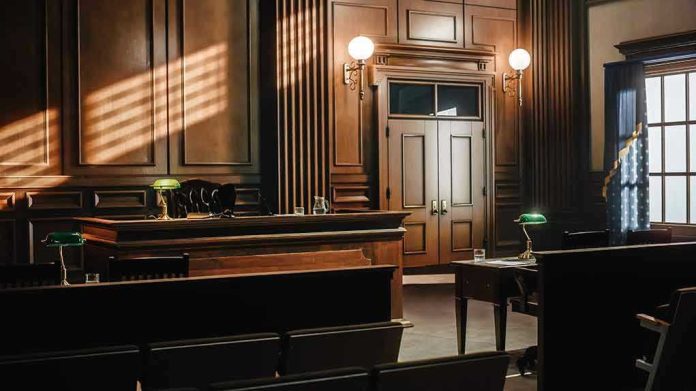
Judicial decisions from the Supreme Court are triggering a new wave of outrage among conservatives, as trusted institutions appear to veer away from constitutional principles and the interests of the American people.
Story Snapshot
- Supreme Court actions in 2025 have deepened divisions within the conservative legal movement, fueling accusations of “betrayal” against the judiciary.
- President Trump has broken publicly with the Federalist Society and its longtime leader Leonard Leo over controversial court decisions.
- Mike Davis, a leading conservative legal activist, has accused a sitting judge of undermining core constitutional values from the bench.
- This fracture threatens to reshape how future Republican judicial appointments are made and may erode faith in judicial independence.
Conservative Movement Fractured by Supreme Court Decisions
In the wake of a controversial Supreme Court decision in late May 2025, the conservative legal movement is experiencing its most public fracture in decades. President Trump, during his second term, has openly condemned Leonard Leo—the architect of his first-term judicial legacy and co-chairman of the Federalist Society—as a “sleazebag” on Truth Social. This dramatic break followed a unanimous ruling from the U.S. Court of International Trade that blocked Trump’s authority to impose emergency tariffs, with the panel including a Trump appointee recommended by Leo. The decision stoked conservative fears that the judiciary, once counted on to defend the Constitution and American sovereignty, is now susceptible to political and ideological drift.
Mike Davis, founder of the Article III Project and a prominent defender of Trump’s judicial nominations, amplified concerns of betrayal from within the judiciary. Davis has long warned about the risks of appointing judges who, despite conservative vetting, fail to uphold originalist principles and constitutional fidelity. In his recent commentary on Fox News Opinion, Davis pointed to a “betrayal from the bench” by a sitting judge, signaling a new era where even Republican appointees are not immune from drifting away from conservative values. Davis’s remarks have resonated with conservatives frustrated by perceived judicial activism and the erosion of foundational rights.
Trump’s Response: Loyalty Versus Legal Philosophy
President Trump’s response to the judicial setbacks has been to shift his approach to judicial nominations. Rather than relying on the Federalist Society’s recommendations, Trump now prioritizes personal loyalty in his judicial picks. This pivot is exemplified by the nomination of Emil Bove, Trump’s former personal lawyer, to the Third Circuit Court of Appeals—a move praised by Davis for valuing steadfast loyalty over institutional independence. The conservative establishment, however, is divided. Many legal scholars and Federalist Society members warn that prioritizing loyalty over judicial philosophy could undermine decades of work to secure a judiciary grounded in constitutional originalism. This tension is playing out in public, with Trump’s allies and the traditional conservative legal bloc openly sparring over the future direction of the courts.
The Supreme Court’s recent actions have not just strained relationships at the top—they have also emboldened critics on the left and right. Trump continues to depend on Supreme Court justices appointed during his first term, even as he lambasts the process that brought them to the bench. The paradox is stark: Trump denounces the very architects of his judicial legacy while pleading for the Supreme Court to overturn what he calls “country-threatening decisions.” Conservative voices worry that this dynamic risks undermining confidence in both the courts and the broader conservative movement.
Consequences for Conservative Values and Judicial Independence
The current rupture may fundamentally alter how Republican presidents approach future judicial appointments. If loyalty becomes the dominant criterion, public trust in the judiciary’s independence could erode, threatening the conservative legal movement’s emphasis on constitutional restraint and originalism. Some Federalist Society members caution that Trump’s approach could undo years of careful legal infrastructure building, while grassroots conservatives see the judiciary’s recent actions as a betrayal of the principles that motivated their political engagement. This discord raises pressing questions about the balance between constitutional fidelity, political loyalty, and the future of American jurisprudence.
As these divisions deepen, conservative legal scholars, judges, and activists are being forced to reconsider long-held alliances and strategies. The pathway to federal judgeships may shift, with loyalty credentials potentially overshadowing legal expertise. For everyday Americans, the stakes are high: the outcome of this internal conservative battle will shape not only the courts but the preservation of constitutional rights, family values, and national sovereignty. The coming months will reveal whether the conservative movement can reconcile its competing visions or if it is destined for further fragmentation.
Sources:
Trump vs. Leonard Leo: The Public Divorce That Splinters the Conservative Legal Bloc
Mike Davis: Supreme Court Betrayed Again — This Time from the Bench
DNC Chair Says “Bulls—” as Dem Frustrations with Trump’s Big, Beautiful Bill Mount














